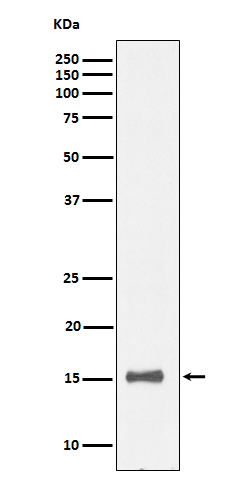
| WB | 咨询技术 | Human,Mouse,Rat |
| IF | 咨询技术 | Human,Mouse,Rat |
| IHC | 咨询技术 | Human,Mouse,Rat |
| ICC | 技术咨询 | Human,Mouse,Rat |
| FCM | 咨询技术 | Human,Mouse,Rat |
| Elisa | 咨询技术 | Human,Mouse,Rat |
| Aliases | ALRH; BHR1; Il13; Interleukin 13; NC30; P600;;IL 13 |
| WB Predicted band size | Calculated MW: 16 kDa ; Observed MW: 13 kDa |
| Host/Isotype | Rabbit IgG |
| Antibody Type | Primary antibody |
| Storage | Store at 4°C short term. Aliquot and store at -20°C long term. Avoid freeze/thaw cycles. |
| Species Reactivity | Human |
| Immunogen | A synthesized peptide derived from human IL 13 |
| Formulation | Purified antibody in PBS with 0.05% sodium azide,0.05% BSA and 50% glycerol. |
+ +
以下是3篇关于IL13抗体的代表性文献(信息简化版):
---
1. **文献名称**: *Lebrikizumab Treatment in Adults with Asthma*
**作者**: Corren J et al.
**摘要**: 研究评估抗IL13单抗Lebrikizumab在中重度哮喘患者中的疗效,发现其可降低哮喘急性发作率并改善肺功能,尤其对高periostin水平患者效果显著(NEJM, 2011)。
---
2. **文献名称**: *Dupilumab Efficacy and Safety in Moderate-to-Severe Atopic Dermatitis*
**作者**: Wenzel S et al.
**摘要**: 该III期临床试验证明,靶向IL-4Rα/IL13通路的Dupilumab可显著缓解特应性皮炎症状,降低炎症标志物,且安全性良好(NEJM, 2016)。
---
3. **文献名称**: *IL-13 Antibodies: Developmental Progress in Allergic Diseases*
**作者**: Gandhi NA et al.
**摘要**: 综述IL13在过敏性疾病中的分子机制,总结Tralokinumab等抗IL13抗体的临床前及临床研究进展,强调其在哮喘和湿疹中的治疗潜力(J Allergy Clin Immunol, 2016)。
---
4. **文献名称**: *Structural Basis of IL-13 Neutralization by Antibody CNTO607*
**作者**: Popescu FD et al.
**摘要**: 通过X射线晶体学解析抗IL13抗体CNTO607的结合表位,揭示其通过阻断IL13与受体结合抑制信号传导的结构基础(mAbs, 2019)。
---
注:以上为示例性内容,实际文献需通过PubMed/Google Scholar等平台按标题检索原文。
Interleukin-13 (IL-13) is a Th2-derived cytokine central to type 2 immune responses, playing a key role in allergic inflammation, tissue remodeling, and host defense against parasites. It binds to receptors (IL-13Rα1/IL-4Rα and IL-13Rα2), activating JAK-STAT signaling pathways that drive eosinophil recruitment, mucus hypersecretion, and fibrosis. Dysregulated IL-13 signaling is implicated in chronic inflammatory diseases, including asthma, atopic dermatitis (AD), chronic rhinosinusitis with nasal polyps (CRSwNP), and eosinophilic esophagitis.
IL-13-targeting antibodies are biologic therapies designed to block this pathway. Most are monoclonal antibodies (mAbs) that either neutralize IL-13 directly or inhibit its receptor interactions. For example, lebrikizumab and tralokinumab bind IL-13. preventing receptor engagement, while dupilumab indirectly affects IL-13 signaling by blocking the shared IL-4Rα subunit. Clinical trials have shown efficacy in reducing exacerbations in severe asthma, improving skin lesions in AD, and decreasing nasal polyp size in CRSwNP. These therapies are particularly valuable for patients unresponsive to conventional treatments.
Despite promise, challenges remain. Patient heterogeneity in IL-13-driven pathologies necessitates biomarker-guided approaches (e.g., periostin levels) to optimize treatment response. Additionally, safety concerns like conjunctivitis in AD patients highlight the need for further mechanistic insights. Ongoing research explores combination therapies and next-generation bispecific antibodies targeting IL-13 alongside other mediators (e.g., IL-4. TSLP) to broaden efficacy. Overall, IL-13 antibodies represent a transformative approach for type 2 inflammation, with expanding applications across immune-mediated diseases.
×